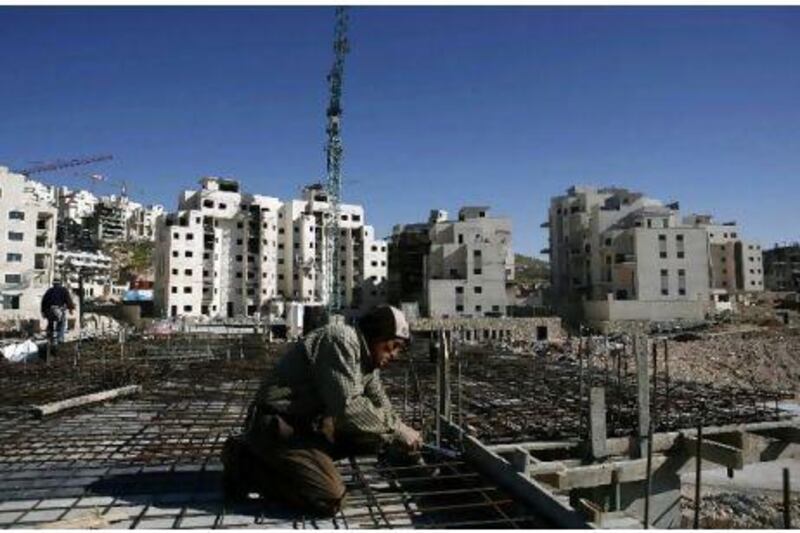JERUSALEM // Left-leaning Jewish groups in the United States defied the pro-Israel lobby and criticised the US veto last week of a UN Security Council resolution condemning Israeli settlements.
In Israel, however, the veto was hardly mentioned. Few among the country's peace groups and rights organisations chose to publicly condemn it, prompting concern about the country's ability, and willingness, to come to a negotiated peace with the Palestinians.
Hanan Ashrawi, a prominent Palestinian politician who maintains ties to Israeli activists, said: "It's amazing. I expected that they would have said something immediately. I really think there is self-censorship, intimidation. The peace movement has become quite reticent."
Yet for many Israelis, the muted response comes as no surprise.
Israel's peace movement and many human-rights organisations have downsized and receded in influence since the Oslo peace accords negotiations in the 1990s.
This mirrors a similarly dramatic decline of Israel's left-leaning political establishment in a Knesset increasingly filled by right-wing, pro-settler parliamentarians.
Gershon Baskin, the Israeli co-director of the Israel-Palestine Centre for Research and Information, said: "You have to put this in context. There is no peace camp anymore. The progressive part of Israeli society is disjointed, fragmented and small. The majority of Israelis since the second intifada have certainly turned into peace sceptics."
Meanwhile, many Israelis point to the outburst of racism and anti-democratic sentiment sweeping the country, manifesting itself in legislation that critics say singles out left-leaning organisations opposed to Israel's occupation of the West Bank and policies regarding the Palestinians.
The groups have decried a bill passed by the Knesset last Monday requiring NGOs to disclose their funding from foreign governments. Another proposal would impose penalties on Israelis who call for boycotts against their country. This too is perceived as directed against left-wing groups, some of which are calling for boycotts of companies and entities involved in Israeli settlements.
Arik Ascherman, the executive director of Rabbis for Human Rights, said: "I haven't seen anything like this since the first Lebanon war, where anyone who disagrees is a 'traitor'," referring to Israel's 1982 invasion of Lebanon.
His organisation did not take a position on the US veto, but he said: "I can tell you on a personal level that it's perhaps a bit frustrating but not unexpected. I don't know that anyone expected anything else".
The settlement building has brought global condemnation and isolation and is seen as a violation of international law.
Continued Israeli control of the West Bank's roughly 2.5 million Palestinians would erode the Jewish majority, so goes the thinking; it also risks keeping in place a discriminatory military occupation that critics increasingly refer to as Israel's version of apartheid.
Israel's former prime minister, Ariel Sharon, is thought to have been so alarmed by these scenarios that he decided to unilaterally uproot all of Gaza's Jewish settlements in 2005.
The US Security Council veto seems to strike at the heart of the matter.
One employee at a prominent human-rights organisation who spoke on condition of anonymity explained the rationale of not commenting on the US veto as a matter of "politics". Israeli rights activists and researchers could be forgiven for being afraid. It is not rare for them to be beaten by settlers and also denounced by everyday Israelis as traitors, making their work difficult. On top of this, they face arrest by authorities.
Yariv Oppenheimer, the director general of Peace Now, said: "It's very hard for Israelis to be against an American veto that helps an Israeli agenda.
"I can criticise my own country's policy, but condemning America for what is seen as protecting Israel in the international arena is not an easy thing to do."
Tamar Hermann, a professor of political science at the Open University of Israel and a senior fellow at the Israel Democracy Institute who has studied the country's peace movement, described this as a unique Israeli fealty towards America among left-wing organisations.
"As far as the American move is concerned, I suppose that the Israeli peace movement is the only pro-American peace movement in the world," she said.
Criticising it, then, would be counterproductive. "If [groups] did, what good would this do?" she said.
Part of the movement's fracturing over the years has to do with taking positions considered well beyond what is accepted in Israel's political discourse, she said. Some groups speak in terms considered too radical while groups in the peace camp have had falling-outs over issues such as the interpretation of Zionism.
The blunt indictment of Israeli society offered by Ronnie Barkan, an Israeli who belongs to the Anarchists Against the Wall, a fringe group of activists, would seem to embody this polarisation. "The vast majority of Israelis are nationalistic and racist," he said.
"There is nothing new in the absolute, unconditional support coming from the US toward Israel and its crimes."
[ hnaylor@thenational.ae ]





